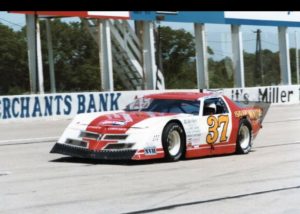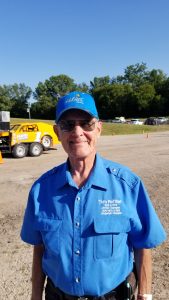The Vault
1972 – THE BIRTH OF WIR’S RED, WHITE & BLUE STATE CHAMPIONSHIP SERIES
Posted on: Tuesday March 29, 2022

This sign listing all the Red, White & Blue state champions greets race fans when they stroll walk through the gates at Wisconsin International Raceway in Kaukauna, Wisconsin.
The tradition continues in 2022 with the Red Race kicking off June 9th during “Thursday Night Thunder” action at Wisconsin International Raceway in Kaukauna. This is a chapter from the 2016 release “Wisconsin International Raceway – Where The Big Ones Run.”
When the Red, White and Blue state championship series was created by Joe Van Daalwyk and Gary Vercauteren in 1972 the series meant different things to different drivers.
The series carried with it a lot of prestige in the racing community. It drew Dick Trickle to WIR for all of those series races throughout the ‘70’s and into the 80’s. “Back then it was truly a “who’s who” on those Sunday afternoons there,” said Milton’s Dave Watson, a three time R, W & B champion. “When you had all these heavy hitters from different tracks in the state it was a big deal. I was only racing for a couple of years when I came home from Vietnam.”
Watson won his first title in 1973. “Back then Dick (Trickle) was running it and Joe Shear was my teammate for those early years and he was tough,” said Watson. “Then you factor in the other Central Wisconsin guys like (Tom) Reffner, (Marv) Marzofka, (Jimmy) Back and later on Larry Detjens. Personally I really liked WIR because it was different and not a cookie cutter track.” Watson would later go on to win the Fox River Racing Club Thursday night title in 1982.

Milton, Wisconsin native Dave Watson is a three time Red White & Blue champion at WIR. (Bob Bergeron photo)
In the early 1970’s Watson would team up with another future four time R W & B champion Joe Shear of Beloit. “I bought Joe’s car in 1970 and we raced out of the same garage for four years,” recalled Watson. “Joe was a very quiet guy. He was pretty intense. And he was pretty shy. If they didn’t know him thought he was aloof. But that wasn’t really the case. Truth is he was thinking about racing all the time. Joe was a good man.”
After winning R W & B titles in 1979, 1987, 1988 and 1996, Shear died of cancer March 6, 1998.
The R W & B series garnered miles and miles of ad copy in the regional racing papers Midwest Racing News and Checkered Flag Racing News. WIR P.R. man at the time, Gary Vercauteren, was one of the best in the racing biz.
“Gary Vercauteren was great at what he did and he lived and breathed racing,” said Watson. “He really promoted the Red, White and Blue series hard. He got the drivers there. And then it was hyped up. It seemed most of the race fans in Wisconsin knew about those shows and that series when it started.”
Throughout his career Watson was almost always a “hired gun”, landing top notch rides. “I remember I drove for Lyle Lundy when I won the Thursday night title in ’82,” recalled Watson. “Lyle was from Waukesha. He had a tire shop. He was into advertising. We both got turned onto each each from Mike Randerson. Mike was an absolute genius the ‘70’s and ‘80’s were awesome. I couldn’t (race) today. If you don’t have an Uncle or a Grandpa with a big checkbook it’s pretty tough to do. I was lucky enough to basically race for a living. WIR had the three series specials, plus the Spring opener and the Fall special they had. Those were five races every year that paid real well.”
It was cold, hard cash that drew a pair of Central Wisconsin’s finest to the Red White and Blue – Rudolph’s Tom “The Blue Knight” Reffner and Nekoosa’s “Marvelous Marv” Marzofka.
At the height of his racing career Rudolph’s Tom Reffner dominated the asphalt short track scene in the mid 1970’s.
“The Blue Knight” as he was affectionately known won an incredible 67 feature races in 1975 racing his tricked out, AMC Javelin. “We won 65 percent of the races we entered that year,” said Reffner, who also pocketed $50,000 in prize money that year. Not bad for a pipefitter by trade!
It was while he was in boy scouts when he met his good friend Dick Trickle for the first time. Reffner was just eight years old. Before the Central Wisconsin Racing Association was formed Reffner and his pals would trapse across the state racing four, sometimes five nights a week.
Reffner honed his craft, winning frequently in the 1970’s at tracks like Plover, Capital Speedway in Madison, Dells Motor Speedway, State Park Speedway in Rib Mountain and LaCrosse Fairgrounds Speedway. “We started running WIR after they blacktopped it in the late 1960’s,” said Reffner. “That was the first year they ran the USAC type cars. Jim Back and I were together at that time. We owned a car then. When they started running regular late models on Thursday nights we came over as soon as they allowed late models to run we ran there for awhile.”
“WIR was real similar with the gearing to West Salem (LaCrosse). We had experience on the longer track. WIR and Lacrosse are really close except for the dogleg. As far as the track went it wasn’t a big deal. We had gearing and such. That bigger track drew us. They are both horsepower tracks. WIR is tough on the brakes – later in the longer races anyways.”
Reffner was always a frontrunner in the R W & B, winning some of those feature races. But for some reason fate would have it where “The Blue Knight” would get snakebitten and always seemed to come up short. “I should have won two or three of those Red, White and Blues,” said Reffner. “I got second a few times in the series and won some features there. Something always seemed to happen with crashes and blown motors along the way.”
Reffner played bridesmaid roles three different times in the R W & B in Kaukauna despite winning a number of those series feature races. Sundays they’d change gears at the track (if they weren’t too hot) and boogie over to Golden Sand Speedway in Plover, WI. “Heck those few Sundays were hectic,” recalled Reffner. “I remember a lot of times we wouldn’t even wait to get paid. We’d just hit the road and change gears when we got to the track.”
It wasn’t all peaches and cream for Reffner at WIR. “I had a few bad wrecks along the way,” said Reffner. “I remember getting into it with Larry Schuler one time on the backstretch. It was a bad crash. A real bad one.”

Tom Reffner
The Superamerica sponsorship deal in the 1970’s also helped boost Reffner, and Trickle’s popularity. “John Boegeman was from Shakopee, Minnesota and he was the first guy they sponsored,” said Reffner. “He was the Black Knight. He was real good friends with their advertising manager. I was sharing a race shop with Dick (Trickle) back then. They sponsored Dick after Johnny,” said Reffner. “Then they picked me up and I was the purple night. Dick was the White Knight. The sponsorship actually started back in 1973. I only had a small sticker in ’74 and my bigger deal came in ’75.”
It wasn’t that much money involved early on. “But what they really helped with was the fuel for the hauler,” said Reffner. “There was some money we got, but that free fuel to go to the tracks was huge, as much as we were running. That made traveling that much easier to do.” During the later years Superamerica would help with engine and chassis purchases as well for the teams.
With the brutal travel schedule Reffner relied heavily on crew chief Pete Haferman and crew member John Bovee during the five-night-a-week grind. “They’d drive to the track and back home from the track while I slept,” said Reffner. “It was the only time I could really sleep would be to and from the track. I was a pipefitter by trade. When it got real busy with racing I’d slow down with the work. I remember one year we ran 120 races.” In the later years of his career his wife DeeDee would often serve as his lone pit crew member.
Marv Marzofka’s made WIR a weekly stop in the early 1970’s one entire season. “They were paying so well it was a pretty easy decision to come over there,” said Marzofka. “I had been running the Dells and had sponsors there. I butted heads with ol’ Roger Regeth there for a while. We pretty much had things our way. You could walk out of there with between $700 and $1000 with the big cars. The pay was incredible back then, compared to what promoters in central Wisconsin were paying out.”
“Then when they started the Red, White and Blue series We’d come back for those shows. (Jimmy)Back and Trickle bought a car and wanted me to drive it. I had sold my car. I was a top five car. I never won a race in the series but I had a bunch of top five finishes. I’d like to say I was always a frontrunner. Trickle wouldn’t let anybody else win those – he dominated at WIR.
”Sundays were a busy day of hustle and bustle, as the crew would quickly load up and hustle to race Sunday evening closer to home at Plover. “We had to know where the police were sitting on that drive back on highway 54,” Marzofka quipped. “I never had a bad wreck at WIR. It wasn’t that hard to drive. It was hell on motors though because we had the tight corners and the long straightaways. If you wanted to power out of the corners the tongue of the engine was hanging out by the end. She was usually tired.”
“One month we ran 17 days in a row. Monday was Queens day, for the wives. We hit Marne, Michigan and Cayuga, Canada Monday and Tuesday. Wednesday was Lacrosse, Thursday Wausau, Friday Dells, Saturday Madison, and Sundays Plover. Then we’d start all over again by throwing in another special out of state and it was like a marathon.”
“I’d take an hour or two of vacation at a clip so we could go racing so much. I ran Elko, Minnesota weekly one years because I had Iten Chevrolet from Minnesota as a sponsor. I’m catching up now on the sleep we missed. In addition to the great payout, I remember those Sunday afternoons being very, very hot at WIR. But great times all around.”
Marzofka is now 76 and like Reffner, devotes much of his time to the Dick Trickle Memorial project based in Wisconsin Rapids.
WIR RED WHITE AND BLUE STATE CHAMPIONS
1972 Dick Trickle
1973 Dave Watson
1974 Rich Somers
1975 Johnny Ziegler
1976 Dave Watson
1977 Dick Trickle
1978 Dick Trickle
1979 Joe Shear
1980 Dick Trickle
1981 Dick Trickle
1982 Dave Watson
1983 Dick Trickle
1984 Dick Trickle
1985 Mark Martin
1986 Mark Martin
1987 Joe Shear
1988 Joe Shear
1989 Doug Herbst
1990 Rich Bickle Jr.
1991 Jim Weber
1992 Robbie Reiser
1993 Robbie Reiser
1994 Steve Carlson/Jim Weber
1995 Matt Kenseth
1996 Joe Shear
1997 Jim Weber
1998 Rod Wheeler
1999 Lowell Bennett
2000 Rod Wheeler
2001 Terry Baldry
2002 Terry Baldry
2003 Jeff Van Oudenhoven
2004 Lowell Bennett
2005 Jeff Van Oudenhoven
2006 Mike Gardner
2007 Gregg Haese
2008 Tim Rothe
2009 Lowell Bennett
2010 Lowell Bennett
2011 Ross Kenseth
2012 Lowell Bennett
2013 Jeff Van Oudenhoven
2014 Maxwell Schultz/Brett Piontek
2015 Steve Apel
2016 Casey Johnson
2017 Bobby Kendall
2018 Bobby Kendall
2019 Maxwell Schultz
2020 Jesse Oudenhoven
2021 Casey Johnson

This book can be purchased at this website. Simply click on the “books” tab on the upper left corner and follow the prompts.


